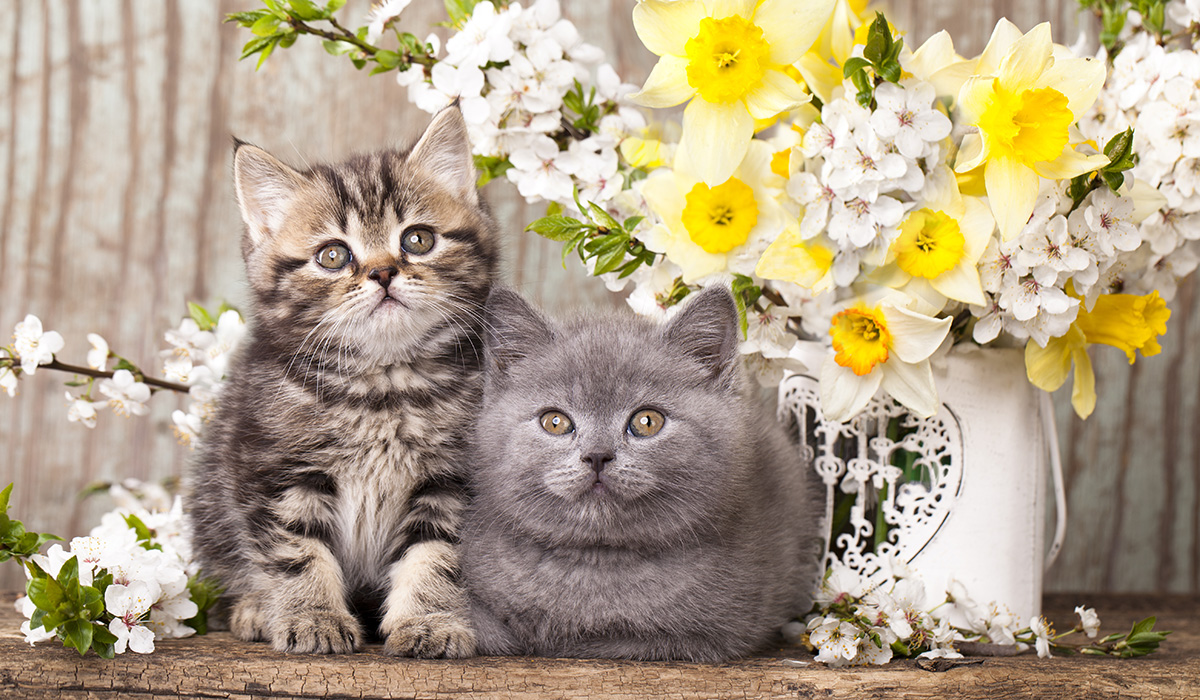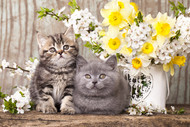Home Hazards for Cats
28th Jan 2025

Cats are curious by nature and as lovely as this is, it does sometimes mean they can unknowingly get themselves into some hazardous situations. Eating, biting and playing with things around the house, that can be potentially hazardous or poisonous to them. Unlike dogs, cats tend to be a bit pickier as to what they will try to eat, but this doesn’t stop them having a little curious nibble on potentially dangerous household items.
Below is a list of some of the items to be aware of, some may be more obvious than others. Ensure these are kept away from your cat to prevent them from becoming ill or causing harm to themselves.
House plants and flowers.
As lovely as it is to brighten up your home with some pretty and great smelling plants and flowers, some of these can be very dangerous to our feline friends. Some of the more common ones include: Daffodils, Sago palms, Asparagus ferns, Jade plants, Hyacinth, Lilies, Aloe, Chrysanthemums, and Tulips
There are many more not listed. So just to be on the safe side, we suggest that, before getting a new house plant or bringing home flowers, check whether they can cause harm to your cat. This can easily be done by checking in with your vet or researching online.
Hair bands or rubber bands.
Rubber bands, hairbands, tinsel, tape, and thread can all have a very similar effect on your cat if swallowed. The main problem is that they can cause a blockage in your cat’s digestive system, causing gastrointestinal issues, intestinal blockages and in some cases, even death. If you are lucky these things can sometimes pass through without causing an issue, but if your cat experiences constipation, vomiting, they are off their food, or seem to be experiencing tummy pain, we would advise taking them to the vet, as these could be a symptom of a blockage or more serious problem. If you see any of these items stuck while your cat is trying to pass them, please do not try and pull them out, as this could cause more damage to your cat’s insides.
Human food.
Although sometimes it may be very tempting to give your cat a human snack, this should always be avoided, as some human food can be toxic to cats. Some of the main foods to avoid giving to your cats include, but are not limited to, Chocolate, coffee and any food/drink containing caffeine. This is because these foods contain high levels of Methylxanthines which if eaten, can be extremely toxic to cats. Grapes, raisins, and currants should not be given to cats as they can cause kidney failure, especially if your cat is already suffering from kidney disease. Anything containing Alcohol should be avoided as just a tiny amount can be extremely toxic to your cat. Another food group that can be toxic to cats is Allium species, this includes all types of onions, leeks, garlic, and chives. This food group destroys your cats red blood cells and can cause life threatening anaemia. Always remember that a cat is an obligate carnivore and has very specific dietary requirements to stay fit and healthy.
Cleaning products.
Cleaning products can be very toxic to your cats, especially if undiluted and ingested. They can also cause skin and eye irritation to your cat. We would recommend keeping cleaning products locked away where your cats can’t get to them and letting any surfaces dry, before your cat walks on them. Try to use cat safe products, where possible.
Medication.
Never give, or leave lying around, any human medication, as cats metabolise medications very differently to us. Medication such as pain killers, birth control pills, ADHD medication, blood pressure control, laxatives, sleep aids and cholesterol lowering agents are some of the more common but toxic medications your cat may accidently ingest. Please seek veterinary advice if you think your cat may have accidentally ingested any human medication. Along with human medication, human supplements can also be toxic to cats. The worst ones being vitamin D and iron, which depending on the amount ingested, can cause vomiting and diarrhoea, and if ingested in excess, kidney and soft tissue damage.
Electrical wires.
A cats naturally playful instinct can lead to them playing with and gnawing on electrical wires. Not only is this dangerous for your cat as it can cause electrical burns and electrocution but also poses a fire risk. We would recommend keeping wires out of sight of your four-legged friends where possible. Placing them behind furniture, attached to the wall, or in trunking. If this is not possible, use cable ties, pet cord protector covers and chew safe cables.
Sunscreen, lotions and sprays.
Some sunscreens contain zinc oxide which can be toxic to cats if ingested. Other things to be careful of are essential oils, especially anything containing citronella or tea tree oil.
Inspect sprays and some flea treatments used for dogs, can also be toxic to cats, so we would recommend checking before using these products with cats around.
We hope this has been useful and given you a bit of an insight into hazards in your home for cats and will help you to keep your feline family member safe and free from any danger.
